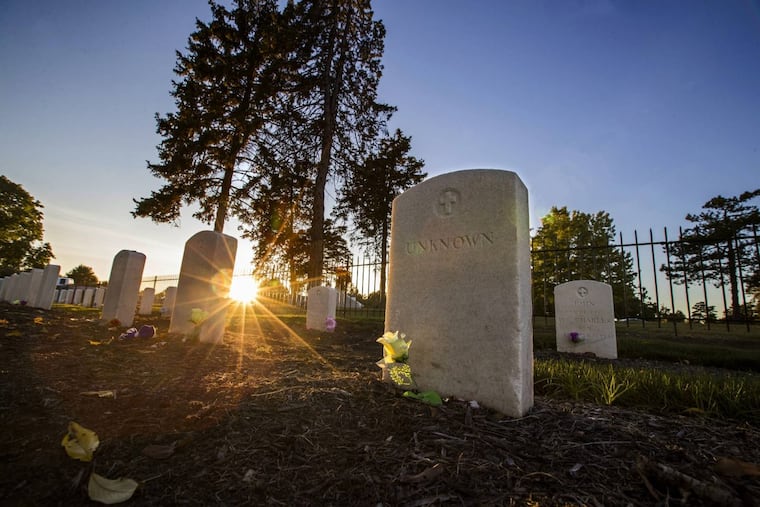Indian tribes to meet on retrieving more children's remains from Carlisle
Fifty-nine tribes have been invited to meet, potentially a huge broadening of a movement that so far has been pursued by a handful of native nations.

Representatives from as many as 59 American Indian tribes will meet next month in Minnesota to discuss the next steps in the repatriation of children's remains from the former Carlisle Indian Industrial School, now the grounds of the Army War College.
A gathering of a large number of tribes would represent a significant broadening of a movement that so far has been intensely pursued by a handful of native nations. The conference follows the August return of the remains of two boys who died at the school, Little Chief and Horse, to their Northern Arapaho people on the Wind River Reservation in Wyoming.
Burials at Carlisle
Click on the dots for more information.
To tribes watching events at the cemetery, controlled by the U.S. Army, that repatriation proved the process could work. But the grave of a third boy, Little Plume, contained two sets of remains, neither of them his — a fresh example of the pain that the boarding-school system continues to inflict on native families. It also raised new questions surrounding the burial of nearly 200 native children in Carlisle, Pa.
“There’s more that needs to be looked into about the boarding schools — the treatment and care and responsibility that they had to our children, in life and in death,” said Christine Diindiisi McCleave, executive officer of the National Native American Boarding School Healing Coalition, the advocacy group sponsoring the meeting.
The coalition said it would invite representatives of all 59 nations with children buried in Carlisle to meet at a tribal round table in Minneapolis on Nov. 30, whether or not they wish to have remains returned.
The Seneca nation has opted to leave Robert Scott and Alfred Jackson in place – but asked that they receive replacement headstones. Like other students, Scott and Jackson were forced to surrender their native religion and embrace Christianity. Their new markers do not contain a Christian cross, prominent on the graves around them.

The nation’s first federal off-reservation boarding school, opened in 1879, worked to “civilize” Indian children by erasing their languages, religions, customs, and family bonds. Beatings were a common punishment, and epidemics killed boys and girls already weakened by hard labor. At the time, forcing Indians to assimilate into white society wasn’t considered wrong. It was thought to be a more humane alternative than killing them outright.
The Carlisle model spread throughout the United States and Canada, with tens of thousands of Indian children boarded at schools. Some scholars blame the legacy of broken family ties and lost languages for ills that plague modern tribes. American Indian leaders say a haphazard 1927 relocation of the school cemetery created hurtful doubt about who lies beneath the earth – and where.
The Northern Arapaho were the first tribe to repatriate their children from the Carlisle cemetery. Within days of those exhumations, the family of George El, who died at Carlisle in 1891, told the Inquirer they want his remains returned. The Oglala Sioux in Pine Ridge, S.D., say they’re exploring the recovery of five children. The Rosebud Sioux in South Dakota seek at least 10 boys and girls, and Alaskan tribes may want children, too.
The coalition said that Yufna Soldier Wolf, a leader in the Northern Arapaho effort and until recently the tribe’s historic-preservation officer, had joined the group as a consultant, and will speak at the round table.
“Our goal is to reach all the 59 tribes who have children buried in the cemetery to present how the process went for the Arapaho, and start a dialogue for other tribes who may want to repatriate or who would like for their children to stay in the Army’s cemetery,” Soldier Wolf said. “We need people to know what’s going on at Carlisle.”
Also speaking will be Matthew L. Campbell, a staff lawyer at the Native American Rights Fund who has worked on repatriation issues. He’s an enrolled member of the Native Village of Gambell on St. Lawrence Island in Alaska.
Tribes can contact the boarding school coalition for information about scholarship funds to assist with travel costs.
